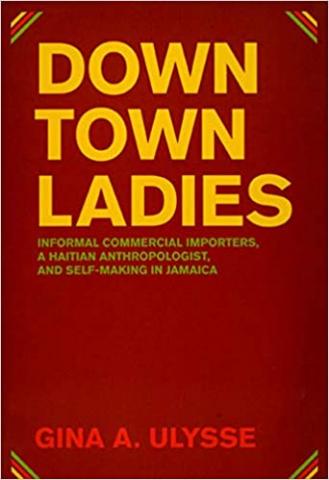The Caribbean “market woman” is ingrained in the popular imagination as the archetype of black womanhood in countries throughout the region. Challenging this stereotype and other outdated images of black women, Downtown Ladies offers a more complex picture by documenting the history of independent international traders—known as informal commercial importers, or ICIs—who travel abroad to import and export a vast array of consumer goods sold in the public markets of Kingston, Jamaica.
Both by-products of and participants in globalization, ICIs operate on multiple levels and, since their emergence in the 1970s, have made significant contributions to the regional, national, and global economies. Gina Ulysse carefully explores how ICIs, determined to be self-employed, struggle with government regulation and other social tensions to negotiate their autonomy. Informing this story of self-fashioning with reflections on her own experience as a young Haitian anthropologist, Ulysse combines the study of political economy with the study of individual and collective identity to reveal the uneven consequences of disrupting traditional class, color, and gender codes in individual societies and around the world.
La « femme de marché » des Caraïbes est ancrée dans l'imaginaire populaire en tant qu'archétype de la féminité noire dans les pays de la région. Remettant en question ce stéréotype et d'autres images dépassées des femmes noires, « Downtown Ladies » offre une image plus complexe en documentant l'histoire de commerçants internationaux indépendants - connus sous le nom d'importateurs commerciaux informels, ou ICI - qui voyagent à l'étranger pour importer et exporter une vaste gamme de biens de consommation vendus dans les marchés publics de Kingston, en Jamaïque.
À la fois sous-produits et acteurs de la mondialisation, les ICI opèrent à plusieurs niveaux et, depuis leur apparition dans les années 1970, ont apporté une contribution significative aux économies régionales, nationales et mondiales. Gina Ulysse explore avec précaution comment les ICI, déterminés à être des travailleurs indépendants, luttent avec la réglementation gouvernementale et d'autres tensions sociales pour négocier leur autonomie. En éclairant cette histoire d'auto-façonnage par des réflexions sur sa propre expérience en tant que jeune anthropologue haïtienne, Ulysse combine l'étude de l'économie politique avec l'étude de l'identité individuelle et collective pour révéler les conséquences inégales de la perturbation des codes traditionnels de classe, de couleur et de genre dans les sociétés individuelles et dans le monde. (Traduit par Mouka)
